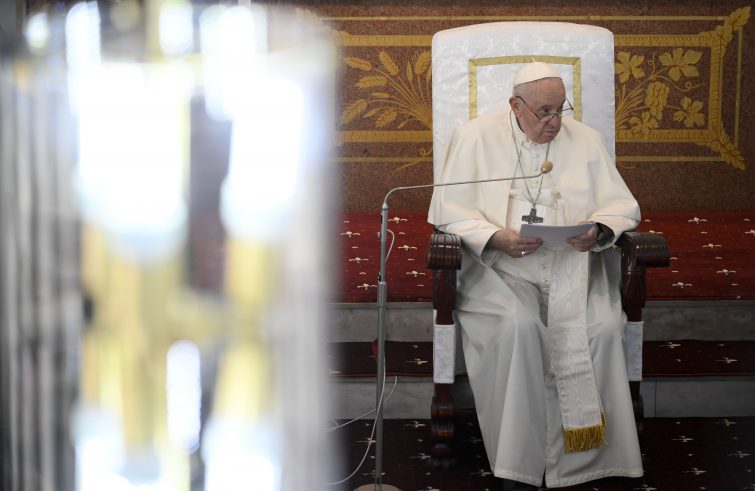
“The path of interreligious dialogue is a shared path to peace and for peace; as such, it is necessary and irrevocable”, the Pope remarked in his last speech in Kazakhstan, delivered at the Palace of Independence in Nur-Sultan, following the reading of the Final Declaration and conclusion of the Congress of Leaders of World and Traditional Religions. His Holiness thus referred to the central theme of his 38th apostolic journey, stating that “interreligious dialogue is no longer merely something expedient: it is an urgent-needed and incomparable service to humanity.”
“Man is the way for all the religions”,
Francis said, thereby updating, so to speak, John Paul II’s celebrated statement in his first encyclical that man is “the way for the Church”. Recalling John Paul II’s visit to Kazakhstan twenty-one years ago this very month, Francis highlighted the “point of convergence” of the faith community: “concrete human beings, weakened by the pandemic, worn out by war, wounded by indifference! Human beings, frail and marvelous creatures, who, ‘once God is forgotten, are left in darkness!’”. “The good of humanity should be taken into consideration ahead of strategic and economic objectives, national, energy and military interests, and in advance of crucial decisions”, is the Pope’s counsel. “To make decisions that are truly great, we should look to children, to young people and their future, to the elderly and their wisdom, to ordinary people and their genuine needs – Francis said -. We have spoken out and insisted that the human person cannot be reduced to what he or she produces and earns; that human beings must be accepted and never discarded; that the family, a word that in the Kazakh language means ‘nest of soul and love’, is the natural and irreplaceable reality that must be protected and promoted, so that tomorrow’s men and women may grow and mature.” The moral and spiritual patrimony shared by all religions rests on two principles: transcendence, “the hidden force that makes our world move forward”, and then fraternity, proximity. “For one cannot profess genuine fidelity to the Creator without showing love for his creatures.”
“Peace is urgently needed, because in our day every military conflict or hotspot of tension and confrontation will necessarily have a baneful “domino effect” and seriously compromise the system of international relations”,
the Pope said referring to current events. In the large Asian country that serves as a bridge between Europe and Asia, mentioning the Council several times, Francis reaffirmed that peace “is more than the absence of war.” “We, who believe in the Creator of all, must be on the front lines in promoting the growth of peaceful coexistence”, the message to religious leaders: “We must bear witness to peace, preach peace, implore peace.” The Final Declaration thus “exhorts world leaders to put an end to conflicts and bloodshed everywhere, and to abandon aggressive and destructive rhetoric.
We plead with you, in the name of God and for the good of humanity: work for peace, not weapons! Only by serving the cause of peace, will you make a name for yourselves in the annals of history.”
“There are altogether too many cases of hatred and division, too little dialogue and effort to understand others. In our globalized world, this is all the more dangerous and scandalous” – the Pope said in his opening remarks – “in challenging times like our own, when the problems of the pandemic have been compounded by the utter folly of war.”
“Extremism, radicalism, terrorism and all other incentives to hatred, hostility, violence and war, whatever their motivations or goals, have nothing to do with the authentic spirit of religion and must be rejected in the most decisive terms possible”,
reads the imperative enshrined in the document signed at Nur- Sultan.
“Maintain a healthy relationship between politics and religion”, is the indication to avoid confusion between the two spheres and to occasion a “sound form of coexistence.” While religion cannot be relegated solely to the private sphere, transcendence “must not yield to the temptation to turn into power.” “How many people are even now persecuted and discriminated against on account of their faith!”, Francis denounced. Referring to the final Document signed at Nur-Sultan, the Pope said: “We have insistently appealed to governments and relevant international organizations to provide assistance to religious groups and ethnic communities whose human rights and fundamental freedoms have been violated, or subjected to violence by extremists and terrorists, also as a result of wars and military conflicts. Above all – Francis said in an exhortation to all those present – we must ensure that religious freedom will never be a mere abstraction but a concrete right.”
“We defend everyone’s right to religion, to hope, to beauty: to Heaven.”
“Women must also be entrusted with greater positions and responsibilities”, the Pope remarked:
“How many calamitous decisions might have been avoided, had woman been directly involved in decision-making!
We commit ourselves to ensuring that women are increasingly respected, acknowledged and involved!
“Let us put into the hands of the young opportunities for education, not weapons of destruction!
And let us listen to them, without being afraid to be challenged by their questions!.” “Above all,” Francis said in his closing appeal, “let us build a world with them in mind! The ingrained attitudes of domination and exploitation, the hoarding of resources, nationalism, war and carving out spheres of influence shape an older world, which the young reject: a world that has no room for their hopes and dreams. In the same way, harsh and repressive forms of religion belong not to the future but to the past.”












